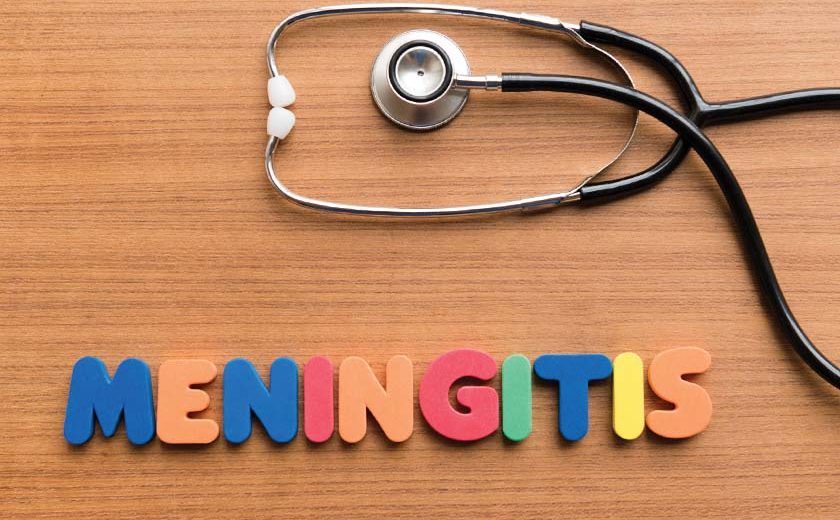Meningitis is an infection of the protective membranes that surround the brain and spinal cord (meninges). Every year, it is estimated that over 1 million people worldwide are affected by meningitis.
Different part of the word has a different incidence rate. Infection is by far the most common cause of meningitis and is caused by many different germs such viruses, bacteria, fungi and parasites. Infants and children under five years old and adolescents between 15 and 19 years of age are most at risk. But anyone in the world can get meningitis at any time and it is possible for anyone to get meningitis more than once. One episode of meningitis does not provide the infected person with lifelong immunity to subsequent episode of infection.
Meningitis can be hard to recognize in the early stages. Symptoms of meningitis can be similar to those of the common flu and can develop quickly, over a matter of hours. The main symptoms to look out for are fever, rash, vomiting, headache, stiff neck, sensitivity to light, and drowsiness. The signs and symptoms do not appear in a definite order, may not occur all together, or may not appear at all.
Meningitis can be very serious if not treated quickly. Bacterial meningitis which is the most severe and common form of meningitis is very serious because its onset is rapid and the infection is associated with a significant risk of death. It causes around 170,000 deaths globally every year. Even with prompt diagnosis and treatment, approximately 10- 20% of patients with bacterial meningitis will die within 24 to 48 hours after the onset of symptoms, and around 10-30% will sustain permanent damage and disability such as mental retardation, deafness, blindness, epilepsy, physical disability etc. It can be treated with appropriate antibiotics that also prevent spread. Many people don’t know that many types of meningitis are vaccine-preventable.
What is meningitis?
Meningitis is an inflammation of the meninges which is the protective lining (membranes) covering the brain. This membrane extends from the brain to the spinal cord.
What are the causes of meningitis?
Meningitis is often due to infection. However, it can also be caused by injuries, cancer or certain drugs. It is important to know the specific cause of meningitis because the treatment differs depending on the cause.
What is worse – bacterial or viral meningitis?
Many viruses and bacteria can cause meningitis. Viral meningitis is the most common and least serious type. Bacterial meningitis is rare but can be fatal if not treated quickly. Several different viruses and bacteria that cause meningitis such as:
- Meningococcal bacteria – there are several different types, called A, B, C, W, X, Y and Z
- Streptococcus pneumoniae (pneumococcal) bacteria
- Haemophilus influenza type B (HiB) bacteria
- Enteroviruses – viruses that usually only cause a mild stomach infection
- Mumps virus
- Herpes simplex virus – a virus that usually causes cold sores and genital herpes
What are the early signs of meningitis? What to look for?
Meningitis can be hard to recognize in the early stages. Symptoms can be similar to those of other viral infection including:
- Fever, cold hands and feet.
- Vomiting.
- Drowsy, difficult to wake.
- Confusion and irritability.
- Sensitivity or dislike of bright lights.
- Severe headache.
- Stiff neck.
- Seizure (fits)
- Severe muscle pain.
- Skin rashes – not everyone who contracts meningitis will get a rash. Don’t wait for a rash to appear before getting help.
* If someone close to you shows signs of meningitis, seek medical help immediately
How is meningitis spread?
Meningitis is contagious and it is possible to get meningitis more than once. The infection is usually spread by people who carry these viruses or bacteria in their nose or throat, but aren’t ill themselves. The infection can also be spread by someone who is ill with meningitis, although this is less common. Generally, the germs that cause bacterial or viral meningitis spread from one person to another when they is exchange or sharing of their respiratory or throat secretions (saliva or spit). This typically occurs during close (coughing or kissing) or lengthy (living in the same household) contact.
How long after exposure to viral meningitis do symptoms appear?
Anyone can get viral meningitis, but it occurs most often in children. Symptoms of viral meningitis generally appear within one week of exposure.
How long after exposure to bacterial meningitis do symptoms appear?
Symptoms of bacterial meningitis can appear quickly or over several days. Typically they develop within 3 to 7 days after exposure.

Who can get meningitis?
Anyone can potentially get meningitis, but it’s more common in:
• babies and young children
• teenagers and young adults
• elderly people
• people with a weak immune system – for example, those with HIV, cancer and receiving chemotherapy
How do doctor diagnose meningitis?
In addition to taking a history and examining the patient, the doctor will do blood tests, urine tests, radiology imaging of the brain such as Computed tomography (CT),magnetic resonance imaging(MRI), or electroencephalography(EEG) to spot problems in the brain. The doctor may also collect a sample of fluid from the spinal cord by doing a procedure called a lumbar puncture or spinal tap. The doctor will do this by inserting a small needle into the lower back of the patient to sample a few drops of the fluid. The doctor examines this sample for signs of inflammation and determines the cause of the exact infection.
Is a spinal tap dangerous and painful?
The discomfort associated with a spinal tap seems to vary widely from patient to patient. No one will say that a spinal tap is comfortable, but it is usually less painful than imagined. Sometimes the worst part is the pinch felt with the injection of the numbing medicine. During a spinal tap, the needle is injected between the third and fourth or fourth and fifth space of the back bone and this is too low to pierce the spinal cord. A spinal tap is not dangerous. The fear of a spinal tap causing paralysis is unfounded. Untreated or inadequately treated meningitis will have many complications including permanent neurological and physical disability.
How to prevent meningitis?
The best way to prevent bacterial meningitis is through vaccination. Vaccines prepare the immune system by exposing the body to a germ so that it is developed to fight an infection when it occurs. Vaccines contain either parts of a germ, live but weakened germs, or inactivated (dead) germs. Meningitis-preventing vaccines have proven to be extremely safe. Because they are composed of purified polysaccharide and protein, there is no possibility of contracting meningitis or any other infection from these vaccines.
The vaccines available protect against the three major causes of bacterial meningitis – meningococcal vaccine for meningococcal meningitis, pneumococcal vaccine for pneumococcal meningitis and Haemophilus Influenzae Type b (Hib) vaccines for Hib meningitis.
However, not all viral meningitis is preventable by vaccines. At present, only meningitis caused by Measles, Mumps, Rubella and chickenpox viruses have vaccines to prevent it.
There is also no vaccine available for fungal meningitis prevention. The risk of contracting fungal meningitis can be minimized by avoiding exposure to environments likely to contain fungal elements (for example, bird droppings and soil).
The risk of getting meningitis can also be minimized by practicing good control of infection such as – regular washing of contaminated hands, avoid sharing personal equipment and maintaining a healthy life style.
Smoking increases the risk of being a carrier of meningitis bacteria. Stopping smoking is good for your health and may lower the risk of spreading meningitis germs.
Is meningitis treatable and curable?
Meningitis is treatable and can be cured if treatment is instituted early. Bacterial meningitis can be treated with antibiotics and fungal meningitis can be treated with antifungal. However, not all viral meningitis has a specific antiviral. In addition to the specific treatment above, people affected with meningitis will require aggressive supportive measures such as adequate intravenous hydration and nutrition, oxygen supplementation, medication to bring down fever, medication to relieve headache and vomiting, medication to reduce brain inflammation and swelling and medication to prevent fit.
Most people who have meningitis make a full recovery, but it can take time. Some may experience a range of different after-effects, which can range from mild to more serious and disabling. Many children and adults with meningitis recover without experiencing after-effects at all.
 Dr Nor Hayati Shaharuddin
Dr Nor Hayati Shaharuddin
Consultant Infectious Diseases and Internal Medicine
BMBS (Flinders)
M. MED. INT MED (UKM)
Fellowship in Infectious Disease Medicine (KKM)


